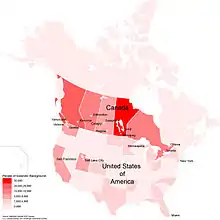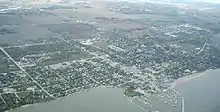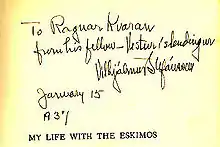Icelandic Canadians
Icelandic Canadians are Canadian citizens of Icelandic ancestry or Iceland-born people who reside in Canada.
| Total population | |
|---|---|
| 101,795 (by ancestry),[1] 0.3% of Canada's population | |
| Regions with significant populations | |
| 31,090 | |
| 26,410 | |
| 20,225 | |
| 13,215 | |
| Languages | |
| Canadian English · Canadian French · Icelandic | |
| Religion | |
| Christianity (Predominantly Protestant) | |
| Related ethnic groups | |
| Icelandic Americans Faroese Canadians Norwegian Canadians Swedish Canadians, Danish Canadians, Dutch Canadians, Flemish Canadians See Icelanders | |
Canada has the largest ethnic Icelandic population outside Iceland, with about 101,795 people of Icelandic descent as of the Canada 2016 Census.[1] Many Icelandic Canadians are descendants of people who fled an eruption of the Icelandic volcano Askja in 1875.[2]
The history between Icelanders and North America dates back approximately one thousand years. The first Europeans to reach North America were Icelandic Norsemen, who made at least one major effort at settlement in what is today Newfoundland (L'Anse aux Meadows) around 1009 AD. Snorri Þorfinnsson, the son of Þorfinnr Karlsefni and his wife Guðríður, is the first European known to have been born in the New World.[3] In 1875, over 200 Icelanders immigrated to Manitoba establishing the New Iceland colony along the west shore of Lake Winnipeg in Manitoba, this is the first part of a large wave of immigrants who settled on the Canadian prairies.[4]
According to historian Gunnar Karlsson, "migration from Iceland is unique in that most went to Canada, whereas from most or all other European countries the majority went to the United States. This was partly due to the late beginning of emigration from Iceland after the Canadian authorities had begun to promote emigration in cooperation with the Allan Line, which already had an agent in Iceland in 1873. Contrary to most European countries, this promotion campaign was successful in Iceland, because emigration was only just about to start from there and Icelandic emigrants had no relatives in the United States to help them take the first steps".[5]
1,245 Icelanders, Icelandic Americans and Icelandic Canadians were registered as soldiers during World War I. 989 fought for Canada whereas 256 fought for the United States. 391 of the combatants were born in Iceland, the rest were of Icelandic descent. 10 women of Icelandic descent and 4 women born on Iceland served as nurses during World War I. At least 144 of the combatants died during World War I (96 in combat, 19 from wounds suffered during combat, 2 from accidents, and 27 from disease), 61 of them were born on Iceland. Ten men were taken as prisoners of war by the Germans.[6]
Notably, Icelandic Canadians do not typically follow traditional Icelandic naming customs, by which people do not have surnames but are instead distinguished by the use of a parent's given name as a patronymic; instead, Icelandic immigrants to Canada have largely adapted to North American customs by adopting a true surname.[7] Icelandic surnames in Canada most commonly represent the patronymic of the person's first ancestor to settle in Canada,[7] although they may also sometimes be chosen to represent the family's ancestral village in Iceland rather than the name of an individual ancestor.[8]
Icelandic population in Canada
The provinces with the most reported Icelandic-Canadians in 2016 are:
| Province or territory | Icelandic Canadian | Percent Canadian |
|---|---|---|
| 101,795[1] | 0.3% | |
| 31,090 | 2.4% | |
| 26,410 | 0.6% | |
| 20,225 | 0.5% | |
| 13,215 | 0.1% | |
| 8,255 | 0.8% | |
| 955 | 0.01% | |
| 660 | 0.07% | |
| 250 | 0.03% | |
| 215 | 0.6% | |
| 200 | 0.5% | |
| 190 | 0.04% | |
| 90 | 0.06% | |
| 30 | 0.08% |
Communities


Gimli, Manitoba, has a high concentration of Icelanders, with 26% of the city population, and 20% of the metro population claiming Icelandic ancestry.[9][10]
Settlements in Canada which are notably Icelandic by foundation or ethnicity:
Notable Icelandic Canadians

- David Arnason, writer
- Stefan Arngrim, actor
- Carleigh Baker, writer
- Paul Bardal, politician
- Adam Beach, actor
- Robert Benson ice hockey player
- Walter Byron, ice hockey player
- Tom Cochrane, musician
- Frank Fredrickson, ice hockey player
- Magnus Goodman, olympic athlete
- Kristjana Gunnars, writer
- Sturla Gunnarsson, film director
- Haldor Halderson, ice hockey player
- Christian Halldorson, politician
- Konnie Johannesson, ice hockey player
- Wally Johannson, politician
- Byron Johnson, former Premier of British Columbia
- Donald K. Johnson, philanthropist
- Janis Johnson, politician
- k.d. lang, musician
- Guy Maddin, film director
- Philip Petursson, politician
- John K. Samson, musician
- Gordon Sigurjonsson, ice hockey coach
- Baldur Stefansson, agricultural scientist
- Vilhjalmur Stefansson, explorer
- Stephan G. Stephansson, poet
- Helga Stephenson, film industry executive
- William Stephenson, secret agent
- Steinn O. Thompson, politician
- Paul Thorlakson, physician
- Charles Thorson, cartoonist
- Joseph Thorarinn Thorson, politician
- Gunnar Thorvaldson, politician
- Torfhildur Þorsteinsdóttir, writer
- Bjarni Tryggvason, astronaut
- W. D. Valgardson, writer
- Lindy Vopnfjörð, musician
- Cully Wilson, born Karl Erlendson, ice hockey player
- Larry Thor, radio and film actor
See also
References
- "Ethnic origin population". Statistics canada.
- "Protected Blog › Log in". strangemaps.wordpress.com.
- "The Vikings: A Memorable Visit to America".
- "Encyclopedia of Saskatchewan - ICELANDIC SETTLEMENTS". University of Regina. Archived from the original on 2012-05-06. Retrieved 2011-08-07.
- Karlsson, Gunnar (2000). History of Iceland. pp. 236.
- Bjarnason, Gunnar Þór (2015). Þegar siðmenningin fór til fjandans. Íslendingar og stríðið mikla 1914-1918. pp. 236–238, 288–289.
- "Icelandic anchor makes Manitoba connection". Winnipeg Free Press, July 26, 2008.
- "Where Are They Now?" Lögberg-Heimskringla, February 24, 1995.
- http://www12.statcan.gc.ca/census-recensement/2016/dp-pd/prof/details/page.cfm?Lang=E&Geo1=POPC&Code1=0317&Geo2=PR&Code2=46&Data=Count&SearchText=Gimli&SearchType=Begins&SearchPR=01&B1=All&GeoLevel=PR&GeoCode=0317&TABID=1
- http://www12.statcan.gc.ca/census-recensement/2016/dp-pd/prof/details/page.cfm?Lang=E&Geo1=CSD&Code1=4618031&Geo2=PR&Code2=46&Data=Count&SearchText=Gimli&SearchType=Begins&SearchPR=01&B1=All&GeoLevel=PR&GeoCode=4618031&TABID=1
Bibliography
- Boultbee, Paul G., "Icelandic-Canadian bibliography", Canadian Ethnic Studies. 29(3):82-94, 1997.
